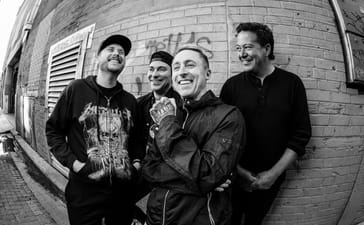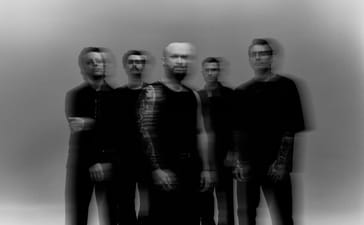When punk rock lords Descendents began work on 9th & Walnut, out now via Epitaph, there was no corporate agenda – no pressure from a label to deliver something, nor was this a way to curtail releasing an album of entirely new material. It started as a passion project, a labour of love that Blunt Magazine would learn, speaking with frontman Milo Aukerman, turned into something none of its four members could have predicted.
With 9th & Walnut, Descendents had built a bridge between seminal releases Ride The Wild and Milo Goes To College. It became a rosetta stone through which to translate a previously unheard era of one of the genre’s most influential forces, featuring the previously unheard works of original Descendents guitarist, the dearly departed Frank Navetta, penned during the band’s formative years but unfinished until bassist Tony Lombardo, drummer Bill Stevenson and vocalist Milo got busy. The songs are jangly and surf-rock-esque, leading in short to 9th & Walnut becoming unlike anything we’ve ever heard from Descendents, albeit fitting perfectly into their catalogue of revered work.
Was it something that you knew the fans wanted so you put in the work to get it done, or is it something that you guys wanted and it just so happened to also be what the fans wanted?
I think we didn’t really think about it as, “This is something people are going to want.” It was unfinished business. It was really just an urge that we all had to finally document these songs. Almost as a way of revisiting our relationship with Frank, because Frank is no longer with us. In 2002, Bill said, “We should have these be documented in some way.” And he started doing that with Frank and Tony.
Now, as to why it took yet another 20 years, that’s a different story altogether. COVID really gave me all this free time. I was recording new songs for a new Descendents record. I got to the end of that and I just had this momentum going. That’s when I told Bill, “Send me that Frank and Tony stuff because I think I want to finish the job,” so to speak. I was able to hear Frank’s songs that I’d never heard before. That was really exciting. It’s almost like unearthing this archaeological thing, like, that’s cool that Frank wrote this song that was a love song because I never knew Frank could even write a love song or whatever, and he did it.
You must have had a new appreciation for how awesome your band is. But from what you’re saying it sounds like you got to rediscover Descendents almost from a fan’s perspective?
Yeah! When I joined, the band was already transitioning into being a fast, almost hardcore band. I sent it even more in that direction, and so I never got to hear Frank with these really almost Kinks-like songs that he had done early on in the Descendents.
In another universe somewhere, there’s a Descendents band that continued down that surf-rock, jangly guitar route. It’s interesting to think where they would end up…
I wonder because I think there were a few bands like The Last during that period, the Paisley Underground, or whatever. Would we have been swallowed up by the Paisley Underground? I don’t know how well that would have worked. That wasn’t really my gig. I love that kind of music, but I much preferred playing with bands like Fear and Black Flag.
There’s this sense of vulnerability with this release which you don’t normally get with punk music – vulnerability in the sense that a lot of bands bury this kind of early stuff if it’s different to what they’re doing now. Is that something that was on your mind when you were opening up the past and diving back into it?
I didn’t feel that. The reason why is because before I even joined the band and I discovered the Descendents for the very first time, it was through Ride the Wild. I’ve always felt like the band really spoke to me in its earliest form. Ride the Wild, I loved it. I grew up listening to The Beatles and all that, so when I heard Ride the Wild, I was like, “This is so cool.”
I’m really proud of how it turned out. I’m really glad that we didn’t have those types of hesitations about this. I don’t care. Good music is good music. It doesn’t have to all be fast and punky, aggressive, or whatever. It can be just whatever. A song like ‘To Remember’ is not a song that you’d ever hear the Descendents play post-1982, but it’s still a great song. Frank wrote this really heartfelt love song and I wanted to do it justice for sure.
Now that you’ve dug back into your past, do you think this is something all bands should do? What’s your take on it now that you’ve done it?
I think if the bands can look back and they have these unrecorded or unreleased things that they can still enjoy in the light of the here and now, if they can enjoy it, there are probably a lot of fans that could enjoy it too. I have faith in that kind of a situation where if you hear quality songs and they don’t sound dated, or they’ve just got intrinsically interesting stuff going on, or good lyrics or whatever, chances are your fans are going to like it, too.
We’re not the first band to do this, but I think it’s a way of completing something that maybe was meant to be completed and never did get completed. It’s a way of displaying to the world that you have a history, that you have a past, and that you’re proud of it, and that you celebrate your past. I think that’s what we’re doing as well with this.
Reading about the album reminded me of a story I heard about the author of Conan the Barbarian, who perhaps spent a bit too much time writing and started hallucinating that Conan was standing behind him with an axe and if the author wrote something Conan didn’t like, Conan was going to chop his head off. Was Frank in the sessions? Could you feel Frank’s metaphorical axe lowering slowly if you were to get something wrong?
[Laughs] I really didn’t. The reason why is because half of these songs I had done with the band. I felt like I put my interpretation on them back then, and he was copacetic whether he was okay with it.
I just got caught up in the enjoyment of these new songs. I just thought, “Whatever I do, I think Frank would be okay with it.” In my experience with my time with Frank and the band, he was pretty much like, “Yeah, you just do whatever.” He never really had a dictatorial view of how I would sing his lyrics. He was such a sweetheart and so I never really felt like, “Oh no, Frank wouldn’t like the way I’m doing this,” or anything.
You mentioned working on new material. What headspace did 9th & Walnut put you in when looking forward?
I think the thing with 9th & Walnut is, it provided us with an extension of sorts, but also, it might be a way for us to redirect our energies into writing simpler music. 9th & Walnut‘s music is pretty simple. I don’t think we ever want to get to the point where we’re just getting too pretty with our music or getting too complicated with our music. I think 9th & Walnut can help us focus our music of now into a simpler framework.
I hope that’s what the case is.








